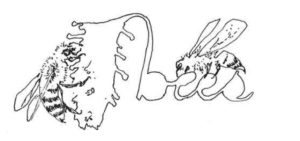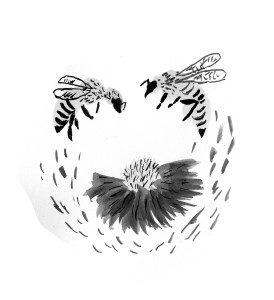Bees-Ness in Montréal
By Cameron Stiff – lesabeillesdespossibles.wordpress.com

It was spring of 2007 when I saw the headline: “Millions of bees mysteriously vanish. Cause unknown.” I had been working on national and international climate change efforts for a few years, but was feeling burnt out. I had resolved to focus on local sustainable development in my community.
I’ve always had an affinity for insects. My first environmental action, at the age of six, was protecting a colony of black ants from attack by my neighbour, who hated bugs (a common sentiment in our society). This dislike puzzled me—insects seemed so cool, with their exoskeletons, enormous strength, architectural prowess, and beautiful colours and shapes.
The rapid disappearance of honeybees became a major issue largely due to to their importance in modern agriculture. Farmers have an oh-too-pivotal reliance on bee pollination to produce fruiting crops, which is why it is standard practice is to truck bee hives from California (almonds) to Florida (oranges) to wherever, placing a significant stress on colonies.
“Colony collapse disorder” (unexplained, sudden abandonment of a hive or mass death of bees) has been stirring headlines. A multiplicity of factors—cell phone signals, mass migration of bees around Turtle Island for pollination services, intensive treatment with antibiotics for parasites and diseases, and exposure to pesticides, fertilizers, and other chemicals in industrial agriculture—may all be playing a role. Most recently, scientists have begun hypothesizing that chemicals used in agriculture suppresses bees’ immune systems, leaving them vulnerable to infection with a parasite called Nosema ceranae. Whatever the reason, this tragic and terrifying phenomenon seems like just one more symptom of a world gone crazy.
So when I got the chance to start beekeeping in 2012, I jumped on it. I put a call out to my network and formed a collective, called the Newbees. Our hive is in the Champs des Possibles, aka the Mile End Meadow. We meet weekly to tend to the bees, plan activities, participate in events, and generally do whatever we can to raise awareness about the importance of the honeybee, and all insects, on Earth.
If you’d like to help, there are a number of things you can do. Making personal choices that support organic agriculture and apiculture (beekeeping) is a great start. Reaching out to friends and family to get them on board is great too. You can get involved politically in anti-GMO campaigns, in the movement for organic agriculture, and in campaigns against the use of pesticides, especially neonicotinoids, the new class of pesticides being pushed by multinational companies like Bayer and Monsanto. If you’d like to keep your own bees, you can check out Miel Montreal—our city’s urban apiculture co-operative—for hives, information, and training opportunities. You can also sign up with Alvéole (alveolemtl.com), a project started by three beekeepers in Montreal that seeks to make beekeeping accessible to all city dwellers. They will install and maintain a hive on your balcony, rooftop, or garden for a fee. Concordia and McGill also have beekeeping projects you can check out.
The bees have a lot to teach us—above all, respect, organization, and collective service. We certainly have a lot to gain by heeding their cry and taking action for sustainability now, before it’s too late. And what better reward than sweet, delicious honey and a better world for all beings?

